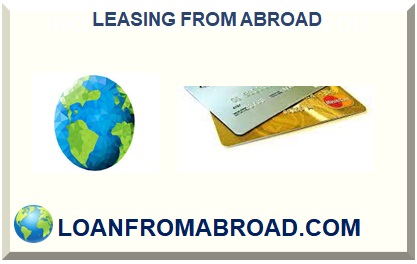
CREDIT CARD FROM ABROAD FOR NON RESIDENT 2024
CREDIT CARD FROM OVERSEAS AS NON RESIDENT
A credit card from abroad for a non-resident in 2024 refers to a financial tool that is issued by a foreign bank or financial institution to an individual who does not hold residency or citizenship in that particular country. These cards allow non-residents to make purchases, access credit, and conduct financial transactions while staying in or traveling to a foreign country. They are specifically designed to cater to the financial needs of individuals who may not have established residency or citizenship but still require a credit facility.
The credit card from abroad for a non-resident has a primary usefulness of alies in its convenience and financial accessibility. It enables non-residents to make payments, rent cars, book hotels, and conduct everyday transactions that may otherwise be challenging without access to credit. Additionally, it can serve as a means to build an international credit history, which can be beneficial for those considering long-term stays or investments in the foreign country.
Obtaining a credit card from from overseas for a non-resident has the main objectives to provide financial flexibility, facilitating cross-border transactions, and accommodating the needs of non-residents for a variety of purposes. They may also aim to attract international customers and generate revenue through foreign transaction fees and interest charges.
The credit card from abroad for non-resdient in 2024 is however not always a good solution for a credit card holder as it depends on individual circumstances. It's important to consider factors such as interest rates, fees, currency conversion costs, and credit limits. Additionally, the suitability of a foreign credit card may vary depending on one's financial goals and travel habits. It's advisable for non-residents to carefully research and compare available options and assess whether obtaining a credit card from abroad aligns with their financial objectives and spending habits.
Can non-residents really apply for a credit card in another country?
Yes, non-residents can apply for a credit card in another country, but it's important to note that the eligibility criteria and application process may vary depending on the country and the financial institution.
Each bank or credit card issuer may have its own set of requirements and policies for non-resident applicants.
It's advisable for non-residents interested in obtaining a credit card abroad to research and contact the specific banks or financial institutions in the target country to understand the application process, required documentation, and any potential restrictions that may apply.
While it is possible for non-residents to apply for credit cards abroad, the approval and terms of the credit card will depend on factors such as the applicant's credit history, financial stability, and the bank's policies.
OVERSEAS STUDENT LOAN CHRISTMAS LOAN LOAN BROKER OVERSEAS PRIVATE LOAN WITH GUARANTEE OVERSEAS MORTGAGE BUSINESS LOAN PERSONAL LOAN TAX ON LOANS WITHOUT COLLATERAL MICROFINANCE P2P LOAN CAR LOAN WITHOUT CREDIT CHECK CREDIT CARD DEBT CONSOLIDATION WITHOUT JOB WITH BAD CREDIT WITHOUT UPFRONT FEE FOR DISABLED ISLAMIC LOAN LIST OF BROKER LEASING FROM ABROAD LOAN FROM OVERSEAS BANK CHINA THAILAND EUROPE FOR MIGRANT FOR WOMEN CAR FOR FOREIGNER ELECTRIC BIKE LOAN STUDENT LOAN REPAYMENT FROM ABROAD LOAN FROM INDIAN OVERSEAS BANK FOR MASTER LOW INCOME LOAN OVERSEAS CROWDFUNDING FOR FARMER OVERSEAS PAYDAY LOAN WITH NEGATIVE RATE OVERSEAS BANK ACCOUNT OFFSHORE BANK ACCOUNT ANONYMOUS BANK ACCOUNT OFFSHORE BANK ACCOUNT ANONYMOUS BANK ACCOUNT GERMANY LOAN SWISS BANK ACCOUNT LUXEMBOURG ACCOUNT PANAMA ACCOUNT DUBAI BANK ACCOUNT LOAN FOR US CITIZEN LOAN FOR BRITISH SWITZERLAND LOAN MORTGAGE FOR ALIEN LOAN FOR HOUSEWIFE FOR FOREIGNER UK LOAN LIST OF GERMAN BANKS KREDIT OHNE SCHUFA USA LOAN AUSTRALIA LOAN FRANCE LOAN BELGIUM LOAN NO PROOF OF INCOME WITHOUT INTEREST START-UP LOAN MAURITIUS MOROCCO NEW ZEALAND LIST OF SWISS BANKS LUXEMBOURG LOAN LIST OF UK CAR LEASING MONACO LOAN SAUDI ARABIA QATAR LOAN FROM GOVERNMENT ANDORRA LOAN FOREIGN INSURANCE FOREIGN CAR INSURANCE FOREIGN HEALTH CARE FOR EXPATRIATE FOR CROSS-BORDER FOR NRI BLACKLISTED LOAN MOTORBIKE LEASING LICHTENSTEIN LIST OF INTERNATIONAL BANKS CANADA LOAN WITHOUT SCHUFA ISRAEL LOAN ITALY MORTGAGE DUBAI LOAN LOAN FOR REFUGEE LEASING FOR FOREIGNER SPAIN PORTUGAL LEASING GERMANY BKR LOAN